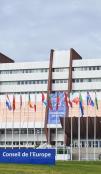Message of the Pope to Diplomatic corps

photo courtesy of the Osservatore Romano
In the occasion of his annual address to the members of the diplomatic corps accredited to the Holy See, at the beginning of the New Year, Pope Francis recalled his numerous Apostolic Visits over the course of the past year, amongst which his visits to the Eastern European nations of Bulgaria, North Macedonia, and Romania. Three countries each different from the others, he remarked, yet linked by the fact that for centuries they have been bridges between East and West, and a crossroads of diverse cultures, ethnicities and civilizations. Highlighting the importance of supporting dialogue and respect for international law, Pope Francis recalled the attention on the foundations of the process of European integration, laid in Western Europe in 1949 with the creation of the Council of Europe and the adoption of the European Convention on Human Rights. The declaration made in that occasion by Robert Schuman, on the 9th of May 1950, was an essential pillar to the entire European integration process. Quoting Schuman, Pope Francis stated that “only through a gradual process of sharing ideals and resources would the continent be able to recover from the devastation of war and the new divisions that arose after it".
The Pope also recalled that the Holy See has followed the European project with great interest from its earliest beginnings, and noted the 50th anniversary of its presence as an observer at the Council of Europe and the establishment of diplomatic relations with the then European Communities. Re-evoking the 30th anniversary of the fall of the Berlin Wall, he then reminded how easy it is to erect barriers. But, he continued, “rather than walls of hatred, we prefer bridges of reconciliation and solidarity”. Therefore, Europe should not lose that sense of solidarity which finds its roots, among other things, in the Roman pietas and the Christian caritas that for centuries have shaped the spirit of the European peoples.





